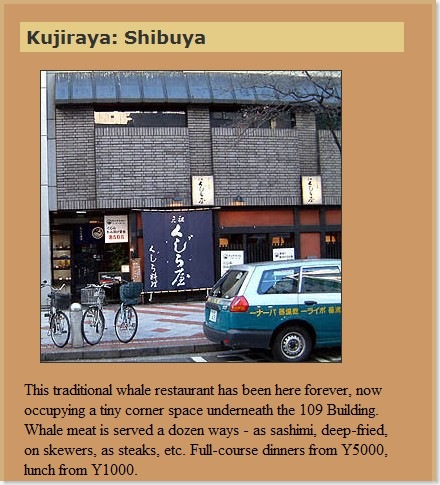Sunday, January 13, 2008
Greenpeace's win is Shibuya's loss, but don't count Japan out quite yet
It's pretty well known that Japan's "scientific" whaling is primarily a commercial venture to keep this traditional food on restaurant menus. There is widespread international condemnation of this blatant deception and of the ongoing kill by the Japanese whale fleet. Greenpeace has recently achieved notable success (see below) in heading off the Japanese whale fleet near Antarctica.
What's not so well known is that Japan is in the forefront of a growing list of countries that want to return to "sustainable" commercial whaling. The list includes: Antigua and Barbuda, Benin, Cambodia, Cameroon, Cote d’Ivoire, Denmark, Dominica, Gabon, Gambia, Grenada, Guinea, Iceland, Japan, Korea, Kiribati, Mali, Marshall Islands, Mauritania, Mongolia, Morocco, Nauru, Nicaragua, Norway, Palau, Russian Federation, St Kitts and Nevis, St Lucia, St Vincent and the Grenadines, Senegal, Solomon Islands, Suriname, Togo, and Tuvalu.
It's important to understand the dynamics of this. Condemnation of Japan's whale hunt is not universal. And if the Japanese fleet should be stopped entirely, there may be alternative sources that they can tap. Especially if they are willing to pay the price. And they will pay, of course.
As the caption on this snippet from the Tokyo Food Page suggests, eating whale meat goes back "forever" in Japan. This restaurant is in the busy Shibuya area of Tokyo, right near the station. It's one of the most popular, affordable, and most accessible of several choices in Tokyo. Japan's "scientific" whaling is enough to sustain an affordable lunch at this restaurant of around $15-20, and a crowd of hungry "scientists" lines up daily for what is considered a delectable treat.
Should international protests continue, no doubt the price of whale sashimi will go up at Kujiraya. But don't doubt that this landmark restaurant will still be around 100 years from now. Greenpeace and other activist organizations are bucking a powerful tradition. The battle needs to be waged, and at the same time, it's helpful to know what they and other determined activists are up against.
Thanks to Viviane Lerner for the link to this article reporting on Greenpeace's success in separating the Japanese whaling fleet from its catch. Embedded in the article is a YouTube video. Since a picture is worth a thousand words (and a video how many?) I'll leave you with this for now.



Post a Comment
Requiring those Captcha codes at least temporarily, in the hopes that it quells the flood of comment spam I've been receiving.